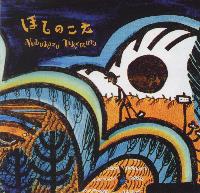 It isn't until the fifth track of 'Hoshi No Koe' that you hear musicstrongly resembling the majority of Nobukazu Takemura's previous work.In and of itself, this isn't such a bad thing. To continue to rely onthe same reverb-laden, scratched, looped, and manipulated CD soundswhich have come to be so closely associated with Takemura (as well ashis "Child's View" alias) would have been redundant, if still quitepleasant to listen to. With the release of the "Sign" 12-inch a fewmonths back, Takemura signaled a shift away from the avant-gardeindulgence of 15-minute tracks of skipping digital beats, and towardsan almost danceable mix of vocoder-enhanced vocals, 4/4 rhythms, andcatchy melodies - and which kept his trademark sound as coolornamentation to what was his most single-y track yet.
It isn't until the fifth track of 'Hoshi No Koe' that you hear musicstrongly resembling the majority of Nobukazu Takemura's previous work.In and of itself, this isn't such a bad thing. To continue to rely onthe same reverb-laden, scratched, looped, and manipulated CD soundswhich have come to be so closely associated with Takemura (as well ashis "Child's View" alias) would have been redundant, if still quitepleasant to listen to. With the release of the "Sign" 12-inch a fewmonths back, Takemura signaled a shift away from the avant-gardeindulgence of 15-minute tracks of skipping digital beats, and towardsan almost danceable mix of vocoder-enhanced vocals, 4/4 rhythms, andcatchy melodies - and which kept his trademark sound as coolornamentation to what was his most single-y track yet.On 'Hoshi No Koe', Takemura shifts back into the avant-garde, whichagain, in and of itself, isn't such a bad thing. Unfortunately, themanner in which he does so is. Gone are the so fresh, so cleancompositions, walls of sound, and floods of echoes perfected on thelikes of 'Funfair' and 'Scope.' Instead, here we hear a handful ofwell-constructed and intriguing tracks separated by what comes off verystrongly as nothing but filler: throwaway Casio noodling on "One Day,""White Sheep and Small Light," and "A Theme For Little Animals";wanna-be clicky minimalism on "Honey Comb" and "Trampoline"; and slowmeticulous beatless repetition on "Stairs In Stars" and "In TheRoom-Roof-Wood". Some of these tracks are less offensivelynot-thought-through than others, but all display a startling lack ofcleverness and ingenuity, and what is most vexing, a seeming lack ofeffort on the part of Takemura, who plays all instruments and producedall tracks on the album. It is one thing to not exactly "get" the newdirection in which a musician wants to take you, but it is anotherthing to not understand at all why he wants to take you there. This isthe case with 'Hoshi No Koe' - there is a clear lack of directionthroughout the overly lengthy 78 minutes that would probably surpriseanyone who has tracked Takemura's work to this point.
This is not to say that his genius doesn't manage to shine through atleast a few times. "Sign" is on the album (the aforementioned track 5)and its the obvious winner of the bunch, and "Anemometer" is asimilarly terrific (if unnecessarily lengthy) melding of bouncy beatsand trademark Takemura sounds. "A Chrysalis" starts out sounding likeexperimental wanking, but slowly and beautifully evolves over its 17minutes into a downtempo exploration of rhythm and tone that wouldn'tbe out of place on 'Scope'. Finishing the CD is the wonderful "TheVoice Of A Fish," which is similarly subdued, subtle, and complex - allcharacteristics which are in short supply on most of the previous tentracks. For whatever reason, these traits - which made Takemura soexciting on previous efforts - are anomalies here.
samples:
Read More

